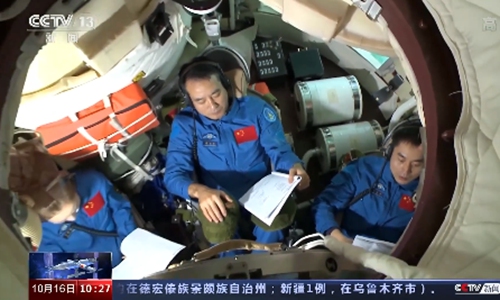Chinese applaud as 2nd crew enter Tianhe module; space progress stokes patriotism, national pride

Photo:Web
Chinese woke up early Saturday morning to witness the success of Shenzhou-13 manned spacecraft in delivering another three taikonauts, including one female, to the country's space station core module Tianhe.
They flooded Chinese social media with posts expressing excitement and good wishes with "Hello the vast outer space, we Chinese have come to visit you again," as a typical one.
On China's Twitter-like platform Weibo, many netizens, while watching the livestreaming of taikonauts sitting in Shenzhou-13 and entering Tianhe module, shared their patriotism and sense of pride to China's deep space exploration over the decades. "Look at how composedly and confidently the three walked into our space station core module," one user wrote. "They have grown into very mature taikonauts."
Many users talked about a photo widespread on Weibo on Saturday, which shows three "extra" copies that People's Daily ran on three October 16s respectively in 1964, 2003 and 2021, which happens to be the three remarkable days in China's technological and space exploration history.
The three People's Daily extra copies covered three milestone events that happened on October 16 in three different years: China tested its first atomic bomb in 1964; Shenzhou-5, the country's first manned space mission achieved a complete success in 2003; and China has successfully launched Shenzhou-13 on Saturday, sending three more taikonauts to its space station core module Tianhe after June.
The picture has impressed many Weibo users, who called it "a romantic feat across time and space." "It shows how big is the progress we've made within only a few decades," wrote one user who forwarded the picture. "Hope our country gets stronger and stronger, sending more taikonauts to space."
"So glad that I was born on October 16; it must be an extraordinary day," another user wrote. "I will pay tribute to our space exploration heroes on my birthday each year."
Along with this picture, photos of renowned space scientists including the deceased Qian Xuesen, known as the "Father of Chinese Rocketry," also went viral on Weibo on Saturday. Chinese netizens paid tribute to him.
"Generation after generation, scientists devote themselves into China's space exploration and tech development," they wrote. "It is their efforts and sacrifices that make what China it is today."
Wang Yaping, the female crew member of the Shenzhou-13 mission, is the first female taikonaut to enter China's space station during its building stage. On Saturday, Wang's long hair floating in Tianhe module caught the eye of Chinese netizens, and many joked that it looked like a pineapple.
Seeing the near-weightless environment make Wang's hair stand on end in the livestreaming, some Weibo users said it was "the coolest hairstyle in the universe." "Congratulations to Wang, she got a small gift from space -- a brand new hairstyle," a user joked.
Wang will conduct spacewalks during her months of staying in Tianhe. Her achievement and efforts have inspired lots of Chinese women to pursue their dreams and make bigger contributions to the country.
"So proud there is a woman looking at the stars in space," one female user wrote on Weibo, saying Wang represents the millions of Chinese women including her. "Wang once said, 'Dreams are like stars in the universe. They look far and unreachable, but as long as we try, we are destined to reach them.' She has inspired me to dream big, and to make unremitting effort for my dreams."
Global Times
